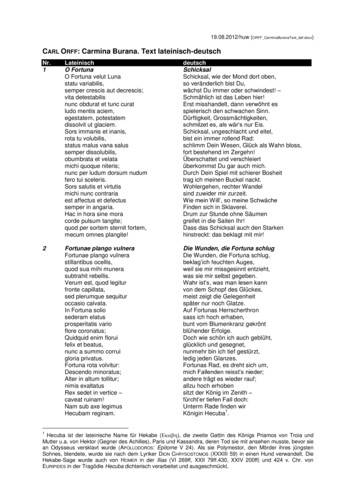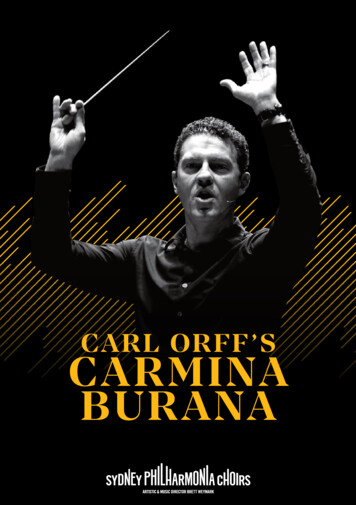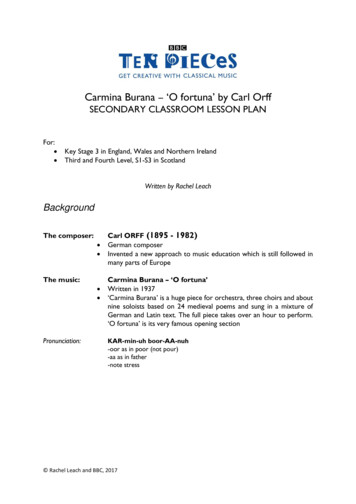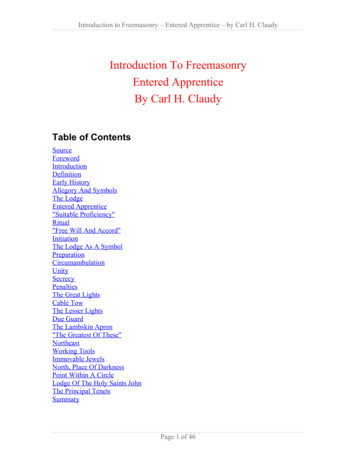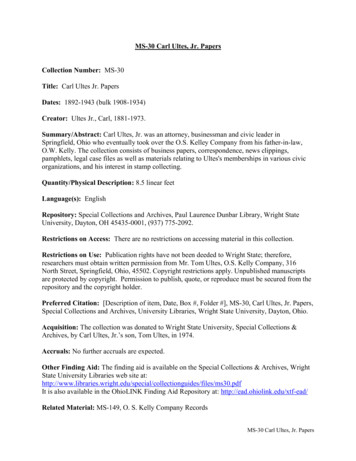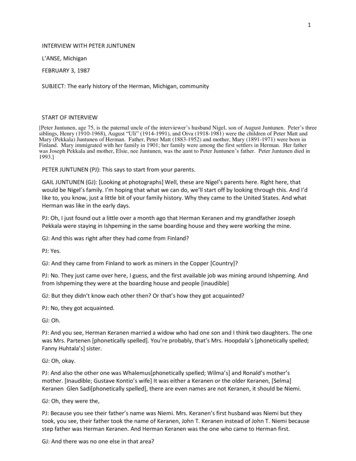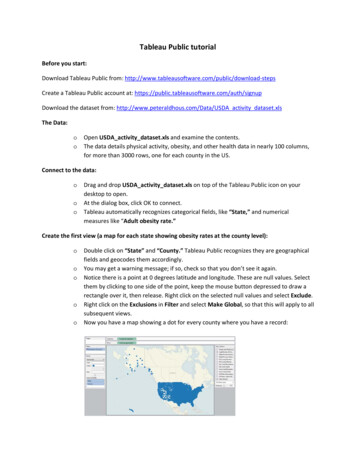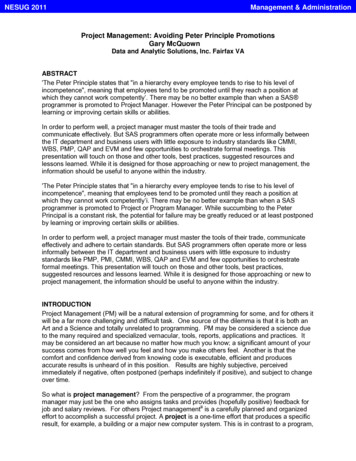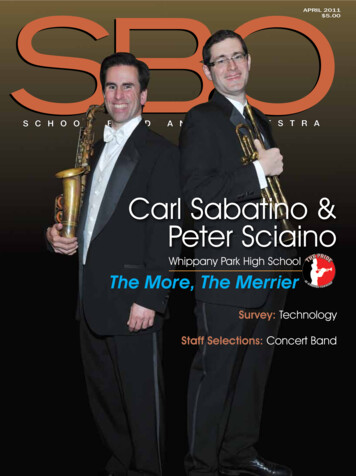
Transcription
APRIL 2011 5.00Carl Sabatino &Peter SciainoWhippany Park High SchoolThe More, The MerrierSurvey: TechnologyStaff Selections: Concert Band
UpClose: Carl Sabatino & Peter Sciaino18 School Band and Orchestra, April 2011
The More,the MerrierThe Pride of Hanover TownshipBy Eliahu SussmanCarl Sabatino and Peter Sciaino are the co-directors of the band program atWhippany Park High School, a small school in Whippany, N.J. Through meticulous design and unflagging enthusiasm, the two have built a marching band,“The Pride of Hanover Township,” that now boasts a whopping 25 percent ofthe student body. Their recruitment efforts have been fueled by the dual goalof providing students the same musical opportunities that larger schools mightpresent and simply making the music program as accessible to as many studentsas possible.In this recent SBO interview, Carl and Peter elaborate on the methodologyand approach they’ve used to build a bigger, more successful band.School Band and Orchestra, April 2011 19
School Band & Orchestra: Hi Carland Peter. Would you give a quicksynopsis of how each of you endedup in music education?Carl Sabatino: I have been teaching here at Whippany Park High schoolsince 1989. Music was something thatI loved as a kid. I wasn’t particularlygood at it, but I had a band director inhigh school who was very inspiring. Iconsider myself lucky, because I guessit worked out. I’m not sure I had anybusiness going in this direction – whenI look at the kids now, a lot of themare way better players than I was whenI was in high school. I worked reallyhard in college, though, and music issomething I’m really passionate about.Peter Sciaino: My turn? Well,I’ve always been great – just kidding!I went to Syracuse for my undergradand NYU for my masters, and came toWhippany Park after I graduated. Carlhad already been here for 8 years atthat point. I started college as an English major – I thought I was going to bea writer. But at the same time, I playedin the jazz ensemble and the marchingband, and took trumpet lessons. Atsome point I realized that that was thedirection I wanted to go in, becausethat’s what I was really interested in.I think I was interested in it all along,but was sheepish about fully embracing it. I also questioned whether Iwas really on the level that I shouldbe to go into music. My parents wereboth educators, so it felt like the rightchoice when I finally made it.was hired that we really started tobuild the program up.SBO: Let’s talk about the WPHSmusic program. Carl, what was itlike when you came on board in1989?SBO: Did the two of you lookaround decide that you neededmore kids in the classroom? Whatwere your goals coming in?CS: When I came on here at WhipPS: Band directors are always lookpany Park High School, I was just aing to grow their programs and reachkid right out of college. There weremore kids if they’re doing their job. I55 students in the band program anddon’t know that we were more mindit was serving the needs of thekids, even though the overall enrollment was a bit low.I was part-time between several schools at first, and bythe time Pete came on board,we’d built it up to about 70kids. We had a marching band– it was pretty small, but itwas a band. We had one concert band, and a jazz band aswell, but it wasn’t until Peter Sciaino and Sabatino.WPHS Bands at a GlanceLocation: 165 Whippany Road,Whippany, N.J.On the web: www.wpmb.orgStudents in school: 630Students in instrumental musicprogram: 148Instrumental music directors: CarlSabatino & Peter Sciaino2010-11 Ensembles & number ofstudents in each:“The Pride of Whippany Park” Marching Band: 148Symphonic Band: 130Concert Band: 81Wind Ensemble: 49Color Guard: 20 studentsJazz Experience I: 23Jazz Experience II: 23Recent notable events2009 Yamaha Cup Group – 5A BestColor Guard2010 NJ Music Educators Association Marching Band Festival – GoldRating2010 USSBA Scotch Plains-FanwoodHigh School Show – Group 6A 1stPlace, Best Music, Best Percussion2010 Yamaha Cup Group 6A – 2ndPlace at New Meadowlands StadiumMay 2011 – To Perform at US CapitolBuilding in Washington D.C.On Deck:Music for upcoming WPHS concertsWind Ensemble: Variations on aKorean Folk Song” by John BarnesChance (B & H)“Arabian Dances” by Brian Balmages(FJH Music)Concert Band:“Days of Glory” by SeanO’Loughlin (Carl Fischer)“Kitty Hawk, 1903” by William Owens (FJH Music)20 School Band and Orchestra, April 2011Jazz Experience I:“Sky Dive” by Freddie Hubbard, arr. Erik Morales (AlfredPublishing)“Li’l Darlin’” by Neal Hefti (AlfredPublishing)Jazz Experience II:“Four” by MilesDavis, arr. John Berry (Prestige)“Moondance” by Van Morrison, arr.Victor Lopez (Belwin)
ful about recruiting early on; it’s morethat we had some success because wewere excited about what we were doing. We worked well together andthe kids responded to that. We wereenthusiastic about the new marchingband show that year, and so were they.They can sense if you’re into it, andthey respond to that. It started to getto a point where we had about 500kids in the school and we were gettingalmost a fifth of the kids in the schoolto participate in the band program.Then we started making goals – lastyear our goal was to get 140 kids onthe field in the marching band, and wewent over that.We’ve always recruited but in thelast five years we taken a multi-tieredapproach and started adding on tohow we recruit.CS: We started taking it much moreseriously.SBO: What do you think increasing the number of students in themusic program means to the kids,the school, and the community?PS: When you have a small schoollike we do, you have the potential forputting the kids at a disadvantage because they can be spread so thin. Youhave to be mindful of the school’s en-Thevironment. If we were at a school thathad 3,000 kids, we probably would dothings differently. At a small school,the concept of getting more kids involved with music really means thatyou have to be super flexible. I knowthat I was having a lot more fun ina marching band with 200 kids thanwhen I was in a band with 30 kids.It’s great to have a full concert bandwithout missing parts or instrumentation. In a small school, it’s easy to havethat smaller program. So the vision isto give these kids that come from a inds f hangeThe 800S Classic Trumpet byOn Sale Exclusively at 1-888-368-777022 School Band and Orchestra, April 2011smaller town and a smaller communitysomething that is on the same playingfield as the programs at some of thelarger schools. And music certainly anarea where we can make that happen.CS: It was a conscious decision ofours over the past few years to growthe numbers, and to go after a different population of the kids. We openedup the band to beginners and anyoneelse looking for what we can provide,which is the sense of community andbelonging, being a part of somethinggreat. We found that just going afterthe kids that are sitting in eighth gradeholding an instrument was a little bitshort sighted. There are a lot of otherkids that want to be a part of whatwe’re doing. So we made a consciouseffort to expand the music program.We felt that it would make us moresuccessful to have more people involved.SBO: How has this recent boost innumbers changed your program?CS: This year was our first yearwhere we really jumped. We had maybe 150 kids marching, and last yearwe had about 110. And particularly,having that many freshman and sophomores was very challenging from aday-to-day standpoint, so that made uswork a lot harder. Having that manydifferent levels of playing is challenging. But we are fortunate that we havea supportive administration and wehave a good infrastructure. We see thekids for a weekly lesson, one-on-one,
so we can cater our instruction to theneeds of the kids, depending on whatever they need. We’re certainly looking to improve upon that, but it’s achallenge.PS: Also just as far as the logistics,when 25 percent of the kids comethrough our door, and those kids arealso involved in field hockey, volleyball, cheerleading, and football,we find that we have to have policiesclearly set for attendance for those after school rehearsals.Our band is fortunate to meet everyday for a period, so we have contactwith all of the kids everyday, whichis great. We wouldn’t want that tochange.SBO: And is the marching band,“The Pride of Hanover Township,”curricular?PS: It is part of the curriculum, butit also meets after school twice a weekduring marching band season. That’swhere it gets challenging. We’re meet-ing after school, and so are the sportsteams. We find that as long as we havea policy and we’re reasonable with thekids as far as our expectations, theyusually respond to that in terms of theirattendance. Nobody is trying to getout of our rehearsals, and that’s a greatfeeling. That means we’re doing some-Wireless PA Systems from Dan Ryder Field DrillsThe Beacon combines the clarity andThe MegaVox Pro PA system delivers 126dB SPL of clear speech projection from a 22W amplifier. True AC/DC functionality with a 110/220 powersupply make the MegaVox Pro truly universal – take itanywhere! Weighing in at only 15 pounds, the MegaVox Pro has optional single or dual UHF receiver.smooth sound coverage of a line array systemwith an enclosure that eliminates the need fora speaker stand. The enclosure includes three8” woofers and an array of eight 4.5”mid-rangespeakers that deploys up to a height of 6’. TheBeacon provides a 120 degree pattern for adistance of 500’ which covers the area of afootball fieldwith just one system. Beacon is in aclass by itself.The Liberty sound system is perfect forsound projection in indoor or outdoor settingsand playing music during school activities.The unit delivers 117dB of intelligible speechfrom one sound system designed for userswith no technical knowledge. The Liberty istruly versatile with true AC/DC operation anda 110/220 power supply. Options includebuilt-in CD player and up to two UHF wirelessreceivers.www.danryderfielddrills.com / 1-800-727-7889 / ryderdrill@aol.comSchool Band and Orchestra, April 2011 23
thing right. The general philosophy of the school is that kidsshould be involved in as much as possible, and we work tokeep up our side of that program as much as we can.SBO: How do you balance the schedule between yourrehearsals and other activities?PS: That’s the hardest part. We have rehearsals twice aweek after school, and the students that play sports havepractice every day. They know when they sign up for bandthat we have a clearly defined commitment policy – it’s asigned contract – so it’s going to be extra work for them.They are aware that they will at least have to split the timeif we have a rehearsal when they have a practice. So if avolleyball practice overlaps with band practice for an hour,they’ll split that overlap down the middle and do a half anhour of each. The coaches are usually good about it, too.They know that we’ve been here a long time and we’re reasonable. A game trumps a rehearsal, and concert trumps apractice. It’s not perfect, but it works.SBO: So you hash out the priorities with the coachesin advance?PS: Carl has always said this and I’m right on board: younever want to put the kids in the middle of these types of situations. You always want to make sure to talk to the coach – if,say, we have a big performance and they have a big game andthe kids are working their butts off to try to be in both placesat once – to come up with the best situation for the kids.24 School Band and Orchestra, April 2011Obviously, we always think that our performances are superimportant and the coaches always think what they’re doing ismore important, but there are times when we’ve given in because we don’t want to put the kid in the middle of it. We’vetaken the hit sometimes. Of course, we could say, “Too bad,you can’t do both,” but then we wouldn’t have the number ofkids that we do have involved in music.CS: We’re trying to really go way out of our way tomake a kid not have to make a choice between a sport and
down. Sometimes we see them comerunning from their practice still intheir uniforms, and we see them goto games with their baritones in theirhands. They do everything they canbecause they see that we’re reallytrying hard to accommodate them.They realize that and they appreciate it.PS: And it wasn’t always like that.As we got better at this, and the bandgot better, and the band became moreof a cool thing to do, it was an easier“We have the entire eighth grade in a little gym andthen – boom! – 140 high school kids come running inholding their instruments in their hands. That’s prettyimpressive for an eighth-grader.”our activity. We never want to put akid in that position, even if it meansthat a kid is not out there for everypractice or if he or she misses the occasional performance. And the kidsare great – they don’t want to let us26 School Band and Orchestra, April 2011sell, the kids were more willing to gothe extra mile. In some cases, they’reworking way harder than we are: theyjust ran four miles for cross countryand then they show up for our prac-tice and we’re marching them aroundthe field for 35 sets in a rehearsal. Andthen they go home and do their homework!SBO: What is it about your programthat has inspired your studentsto want to take on that type ofworkload?PS: Like any music program, we tryto really foster a sense of community.It sounds cliché to say the word “family,” but the social aspect of the bandmeans a lot to the students. In termsof the music we choose and the stylewe tend to march in, we think we’repretty unique because we are community oriented. We try to reach the kidswith music that is important for themto know about, learn from, and getbetter at their instruments through.But we’re also choosing pretty entertaining music that will draw a largereaction from the crowd.SBO: You mean pop material?PS: Absolutely. And we have hadshows where, to make that work, we
also incorporate electronics, guitars,bass guitar
“Arabian Dances” by Brian Balmages (FJH Music) Concert Band:“Days of Glory” by Sean O’Loughlin (Carl Fischer) “Kitty Hawk, 1903” by William Ow-ens (FJH Music) Jazz Experience I:“Sky Dive” by Fred-die Hubbard, arr. Erik Morales (Alfred Publishing) “Li’l Darlin’” by Neal Hefti (Alfred Publishing)



